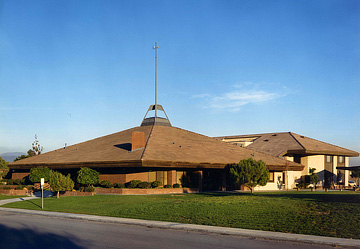In yesterday’s post, I examined 1 Corinthians 3:5-9, considering its implications for how we think about church leaders. I closed by admitting that sometimes it is not easy for a pastor or other leader to seek God’s glory, especially when we are in the midst of conflict. I know from personal experience how difficult this can be.
About fifteen years ago I was in the midst of one the hardest times in my ministry at Irvine Presbyterian Church. I had a staff member I’ll call Shirley with whom I was having many conflicts. From my point of view, she was not fulfilling her job description in many, many ways. From her point of view, I was being imperious and unsupportive. Though I tried everything I could think of to make things work out, they were going south faster than a goose in November. (Photo: The Fellowship Hall of Irvine Presbyterian Church, where we worshiped before we built our sanctuary.)
 During this time, Shirley began to lobby the troops on her side. She complained about how I was mistreating her. She would visit shut-ins and tell them I was getting ready to fire her (which wasn’t true). She was clearly trying to divide the church and was doing a fine job of it. I must confess that I was sorely tempted to join the game and beat her at it. I wanted to get people on my side. I wanted people to know the truth and defend me. The church started to become all about me, . . . me, me, me. We were going the way of the splintered Corinthian church.
During this time, Shirley began to lobby the troops on her side. She complained about how I was mistreating her. She would visit shut-ins and tell them I was getting ready to fire her (which wasn’t true). She was clearly trying to divide the church and was doing a fine job of it. I must confess that I was sorely tempted to join the game and beat her at it. I wanted to get people on my side. I wanted people to know the truth and defend me. The church started to become all about me, . . . me, me, me. We were going the way of the splintered Corinthian church.
Everything came to a head at a meeting of our congregation. This was by far the toughest meeting I’d ever been a part of. The elders of the church were recommending that we dismiss Shirley from our staff. In the congregational debate, many people chewed me out for what they perceived to be my management flaws. These were people who believed they knew the truth because they had heard it from Shirley. The temptation to divide and conquer the church was huge for me. But, by God’s grace and following the counsel of my fellow leaders, I didn’t do it. I took my licks, even ones I didn’t deserve. I owned my failures and tried to listen to what people were saying to me. Frankly, it was excruciating. But I sensed that my job as pastor was to help the church be unified in Christ, not divided in order to defend me. Many of my supporters sensed the same. Though they could have risen to my defense, they realized that it was not the time to do so. Wisely, they remained quiet, and so avoided a fight that could have deeply wounded our church.
The congregation did, in the end, vote to dismiss Shirley. I left feeling, not vindicated, but ashamed and exhausted. Several friends gathered around to encourage me. But I still felt as if I had been taken to the congregational woodshed for a beating.
In the aftermath of that meeting, only a couple of people left our church, much to my surprise. In time, many of those who had scolded me actually came to apologize. One man said, “It was only later that I learned some of what had really happened with Shirley. I’m sorry for the things I said to you.”
But the greatest result of that whole debacle was not that I was somehow more highly regarded or more beloved or whatever. It was that our people ended up, truly, more united in Christ. I can’t explain how this happened, exactly, except that it was a work of grace. But I do know that my effort, and the efforts of those who supported me, to focus on Christ and not on me helped move us toward such a positive result. Nevertheless, I still look back on this whole experience, and the congregational meeting in particular, as one of the hardest times of my ministry. It required that I subordinate myself to a degree I had never done before. It required that I trust in God rather than my abilities to persuade and organize.
If you’re caught in a church conflict, watch out for the role of leaders in that conflict. If battle lines and being drawn up around certain personalities, don’t participate. And if you’re a pastor, I’d urge you to remember – as hard as it may be – that you are merely a servant of the Master. Devote yourself to seeking what’s best for whole church. Seek to unify rather than divide. Don’t let your people choose up sides, even if this game seems to be to your favor. Rather, do all you can do to further the peace and unity of Christ’s church. Let the focus be upon him, with yourself as his servant.

